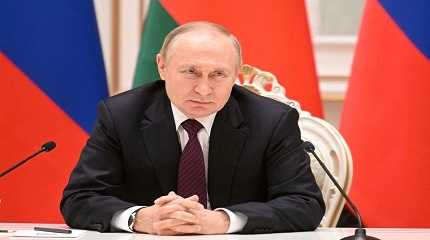
April 5 (Reuters) - Russian President Vladimir Putin told the new U.S. and EU ambassadors in blunt language on Wednesday that their countries were responsible for a dramatic deterioration in relations since Russia sent its armed forces into Ukraine last year.
The ambassadors were among 17 who presented their diplomatic credentials to Putin at a televised ceremony in the Kremlin.
Putin told new U.S. Ambassador Lynne Tracy that U.S. support for a revolution in Ukraine in 2014 had led to the current situation where Russia and Ukraine were in conflict.
He said relations were in "a deep crisis" that was "based on fundamentally different approaches to the formation of the modern world order".
"Dear Madam Ambassador, I know you may not agree, but I cannot but say that the United States' use ... of such tools as support for the so-called 'colour revolutions', support in this regard for the coup in Kyiv in 2014, ultimately led to today's Ukrainian crisis," Putin said.
Speaking separately, Russian Foreign Minister Sergei Lavrov said Moscow needed to maintain relations with Washington even though American supplies of weapons to Ukraine meant "we are really in a hot phase of the war".
Lavrov told state television that Russia had not yet lost hope that the United States "will wake up to reason (and) will resume some kind of dialogue".
Russia responded to a 2014 uprising in Kyiv that drove out a pro-Russian president by seizing the Crimean peninsula from Ukraine and backing an armed separatist movement that took control of territory in the country's east.
Putin took a similar line with the new EU ambassador, Roland Galharague, telling him "the European Union initiated a geopolitical confrontation with Russia".
Nikolai Patrushev, a close Putin ally who chairs Russia's Security Council, told Tass news agency that "with the assistance of the U.S. and its allies, Kiev is intensifying its terrorist activity" in four regions of Ukraine that Moscow said last year it was formally annexing.
Russia says it was forced to intervene in Ukraine to stem Western interference that was becoming a threat to its security.
The West and Kyiv dismissed this as a baseless pretext for a war of conquest.
Putin also urged Denmark to support Russia's proposal to establish an independent international commission to investigate the blasts last September that ruptured the Nord Stream undersea pipelines bringing gas from Russia to Germany.
In his opening remarks, Putin said Russia was open to constructive partnership with every country and would not isolate itself.
Relations between Russia and the West were already badly strained before it began what it calls its "special military operation" in Ukraine, but have plunged even further since then.




